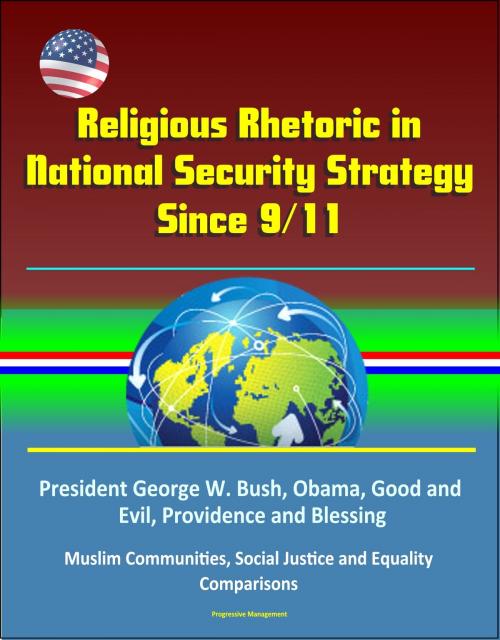Religious Rhetoric in National Security Strategy Since 9/11: President George W. Bush, Obama, Good and Evil, Providence and Blessing, Muslim Communities, Social Justice and Equality, Comparisons
Nonfiction, Religion & Spirituality, Christianity, Church, Church & State, History, Military, Strategy| Author: | Progressive Management | ISBN: | 9781370681143 |
| Publisher: | Progressive Management | Publication: | August 28, 2016 |
| Imprint: | Smashwords Edition | Language: | English |
| Author: | Progressive Management |
| ISBN: | 9781370681143 |
| Publisher: | Progressive Management |
| Publication: | August 28, 2016 |
| Imprint: | Smashwords Edition |
| Language: | English |
Professionally converted for accurate flowing-text e-book format reproduction, this unique book examines the role of religious rhetoric in the articulation and promotion of the National Security Strategies (NSS) since 9/11, that is, of the Bush and Obama administrations, and more specifically how both strategies utilize religious rhetoric to gain support for their respective strategic visions. It will explore not only what is written in the strategy documents themselves, but also what is expressed in the speeches of both presidents in promoting their strategies. It will assess the strengths and weaknesses of each by looking at how their religious rhetoric impacts both the American populace and the international community, and then will look at the implications of the use of religious rhetoric in the promotion and formation of future strategies.
Chapter 1 - RELIGIOUS RHETORIC AND CIVIL RELIGION * Chapter 2 - RELIGIOUS RHETORIC IN THE BUSH ADMINISTRATION * Theme of Good and Evil and America's Sacred Responsibility * Theme of Freedom as a Gift of God and Universal Human Right * Theme of Providence and Blessing * Summary of Bush Themes * Evaluation of Bush Religious Rhetoric * Impact on American Populace * Impact on Muslim International Communities * The Bush Administration Change in Strategy * Chapter 3 - RELIGIOUS RHETORIC IN THE OBAMA ADMINISTRATION * Rationale for Religious Rhetoric Usage * Theme of Inclusivity and Tolerance * Theme of Unity through Commonality * Theme of Social Justice and Equality * Summary of Obama Themes * Summary of Bush/Obama Similarities and Differences * Evaluation of Obama Religious Rhetoric * Chapter 4 - THE ROAD AHEAD
U.S. Presidents and other political leaders throughout the nation's history have articulated the national purpose through religious rhetoric, that is, through the use of religious language to motivate and inspire the American people. President Lincoln referenced the "Almighty" and utilized biblical imagery in several of his speeches during the dark days of Civil War. Similarly, Franklin D. Roosevelt did not hesitate to cite God as a source of hope during the difficult days of World War II, and more recently President Bush freely used religiously couched language in the aftermath of the events of 9/11 and throughout the period of the War on Terror while he was president. President Obama has also integrated religious language into his inaugural address and key policy speeches.
This description of the use of religious language as religious rhetoric is not meant to be pejorative. For many people, the term "rhetoric" has a strictly negative connotation. It is often perceived as language which political leaders use to distort or manipulate facts in order to gain a political advantage or support for a political cause. While it is true that rhetoric is by definition manipulative in that it is "the language of persuasion," it is not necessarily born out of the intent to distort.1 For the many leaders who have utilized it throughout the history of the U.S. nation, religious rhetoric is in fact a sincere application of language which clarifies what they have understood the nation's purpose to be to be.
Professionally converted for accurate flowing-text e-book format reproduction, this unique book examines the role of religious rhetoric in the articulation and promotion of the National Security Strategies (NSS) since 9/11, that is, of the Bush and Obama administrations, and more specifically how both strategies utilize religious rhetoric to gain support for their respective strategic visions. It will explore not only what is written in the strategy documents themselves, but also what is expressed in the speeches of both presidents in promoting their strategies. It will assess the strengths and weaknesses of each by looking at how their religious rhetoric impacts both the American populace and the international community, and then will look at the implications of the use of religious rhetoric in the promotion and formation of future strategies.
Chapter 1 - RELIGIOUS RHETORIC AND CIVIL RELIGION * Chapter 2 - RELIGIOUS RHETORIC IN THE BUSH ADMINISTRATION * Theme of Good and Evil and America's Sacred Responsibility * Theme of Freedom as a Gift of God and Universal Human Right * Theme of Providence and Blessing * Summary of Bush Themes * Evaluation of Bush Religious Rhetoric * Impact on American Populace * Impact on Muslim International Communities * The Bush Administration Change in Strategy * Chapter 3 - RELIGIOUS RHETORIC IN THE OBAMA ADMINISTRATION * Rationale for Religious Rhetoric Usage * Theme of Inclusivity and Tolerance * Theme of Unity through Commonality * Theme of Social Justice and Equality * Summary of Obama Themes * Summary of Bush/Obama Similarities and Differences * Evaluation of Obama Religious Rhetoric * Chapter 4 - THE ROAD AHEAD
U.S. Presidents and other political leaders throughout the nation's history have articulated the national purpose through religious rhetoric, that is, through the use of religious language to motivate and inspire the American people. President Lincoln referenced the "Almighty" and utilized biblical imagery in several of his speeches during the dark days of Civil War. Similarly, Franklin D. Roosevelt did not hesitate to cite God as a source of hope during the difficult days of World War II, and more recently President Bush freely used religiously couched language in the aftermath of the events of 9/11 and throughout the period of the War on Terror while he was president. President Obama has also integrated religious language into his inaugural address and key policy speeches.
This description of the use of religious language as religious rhetoric is not meant to be pejorative. For many people, the term "rhetoric" has a strictly negative connotation. It is often perceived as language which political leaders use to distort or manipulate facts in order to gain a political advantage or support for a political cause. While it is true that rhetoric is by definition manipulative in that it is "the language of persuasion," it is not necessarily born out of the intent to distort.1 For the many leaders who have utilized it throughout the history of the U.S. nation, religious rhetoric is in fact a sincere application of language which clarifies what they have understood the nation's purpose to be to be.















